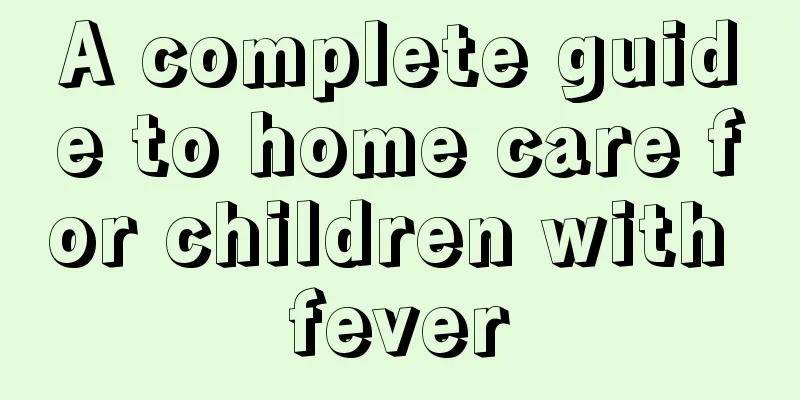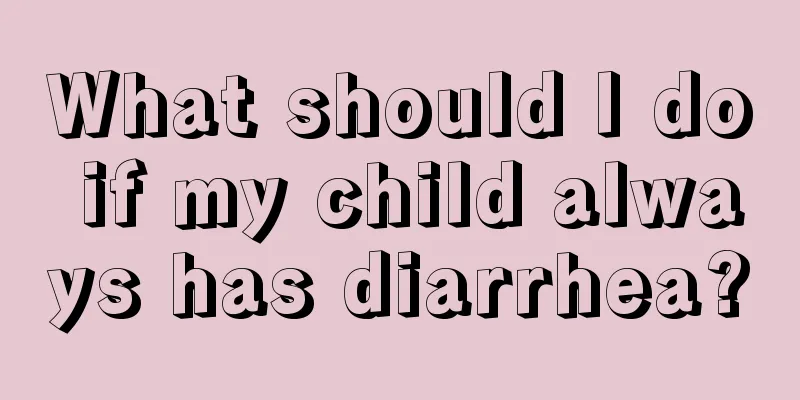A complete guide to home care for children with fever

|
What should I do if my baby has a fever? Parents should not send their children to the hospital for injections and infusions at every turn. This will not only make the children easily dislike the hospital and cry and make a fuss as soon as they arrive at the hospital, but it will also be detrimental to improving the children's own immunity. So how do you cool your baby down without going to the hospital? Here we introduce to you a complete guide to home care for children with fever, mainly home care methods, so that parents can take good care of babies with fever at home. Home care for fever 1. Try to let your child rest more Children with high fever are best to rest in bed, which can reduce energy consumption, muscle activity and heat generation. If a child does not like to lie in bed when he is sick, it means that the child is in good mental state. It can also be judged that the child's illness is not serious and he should not be forced to sleep. If the baby cries non-stop when he is sick, but falls asleep quietly when held, parents should take a little more effort and hold the child all night so that he can sleep well. When the fever first starts, the baby often trembles all over, has cold hands and feet, and a pale face. At this time, you can use a hot water bottle, electric heating mattress, etc. to warm the bed and let the child sleep well. If a child has a fever in the hot summer, the windows should be opened to allow air circulation. When the child is resting, parents should try not to disturb him - frequently taking the child's temperature, feeding him water, and giving him medicine will also make the child feel tired. 2. Drink more water When you have a fever, your breathing becomes faster and more water evaporates, so you need to replenish water in time. Drinking more water can also promote more urination, which helps to reduce fever and excrete toxins. It is best to drink warm water, which is conducive to sweating. Salt water can also be used. 3. Provide more ventilation The air in the room needs to be circulated, and in the summer it is best to lower the room temperature. This will help dissipate body heat through conduction and radiation, which is beneficial for cooling down. 4. Physical cooling You can take a warm bath, and the water temperature should be 1℃ to 2℃ lower than body temperature. These physical cooling methods should not be used when you are afraid of chills or shivering. 5. Observe the condition: If the child has a high fever but has a rosy complexion and is in good spirits, parents do not need to worry or go to the hospital several times a day. Just follow the doctor's instructions and take the medicine regularly. If your child becomes listless, pale, or has frequent vomiting, diarrhea, or headaches, you should go to the hospital for a clear diagnosis in time to avoid delaying the condition. Recurring fever is a symptom of a viral infection. Babies often have a fever in the middle of the night that subsides in the early morning. As long as the virus is not under control, the body temperature will fluctuate or rebound. There is a rule when a child has a fever: if the child's hands and feet are cold and the face is pale, it means that the child's body temperature will continue to rise; if the child's hands and feet become warm and he sweats, it means that the body temperature will not rise any further. The above-mentioned guide to home care for children with fever is very practical. So, when your baby at home has a fever, parents should not be anxious and try the above methods first. Children's own resistance is not strong, and fever is a common symptom for babies. However, if you do not pay attention, it will also have adverse effects on the baby. If the baby's fever is more serious, it is best to send him to the hospital for treatment. |
<<: Possible causes of fever and vomiting in children
>>: Causes of fetal omphalocele
Recommend
Is it okay to use a hot towel when the baby has a fever?
Many mothers will feel nervous and worried when t...
What should children eat if their memory is declining?
Many parents probably have had this question: wha...
What should I do if my 3-year-old baby has cavities?
Due to children's careless diet and parental ...
Can babies drink salt water when they have a fever?
Babies can drink saline solution when they have a...
How to do aerobics for children
As far as many kindergartens are concerned, many ...
What to do if your baby has jaundice
Jaundice is a common symptom among many newborns....
What should I do if my child is slow?
When the child is over two years old, parents sho...
Three-year-old child crying in the middle of the night
Nowadays, many young couples have their own caree...
What should I do if my baby has a stuffy nose, runny nose, and cough?
Babies are prone to cold and cough symptoms. We a...
How to educate a crying child?
Young children usually express their emotions by ...
Causes of Helicobacter pylori infection in children
There are many common diseases in children. When ...
Why does the child cry in the middle of the night?
We all know that children always use crying to ex...
What department should I go to for pigeon breast in children?
Pigeon chest is a medical disease, and many child...
What to do if your child has abdominal distension and vomiting
It is very common for children to have abdominal ...
Baby hits forehead
If we have a baby's fracture, head injury wil...









